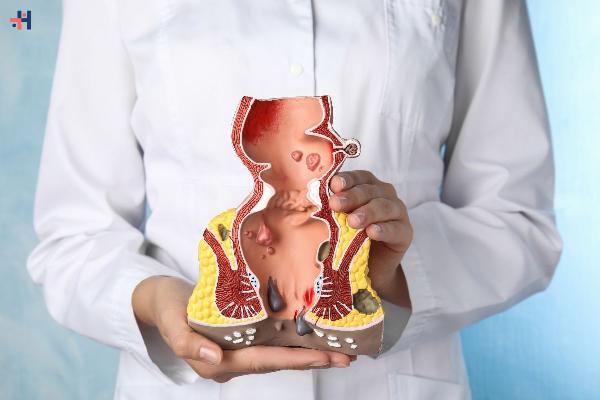Effective Hemorrhoid Treatment: Options, Remedies, and Prevention Tips

Strong 8k brings an ultra-HD IPTV experience to your living room and your pocket.
ment: Options, Remedies, and Prevention Tips
Effective Hemorrhoid Treatment: Options, Remedies | Healthcare 360 Magazine
Understanding Hemorrhoid Treatment
Hemorrhoids are swollen and inflamed veins in the rectum or anus that can cause discomfort, pain, itching, and bleeding. They can be internal, located inside the rectum, or external, situated under the skin around the anus. Effective hemorrhoid treatment involves addressing symptoms, promoting healing, and preventing recurrence through lifestyle adjustments and appropriate medical interventions.
Symptoms of Hemorrhoid Treatment
Pain or Discomfort: Often worsened during bowel movements or when sitting for prolonged periods.
Itching or Irritation: Around the anus, often due to mucus discha rge or skin irritation.
Swelling: Visible lumps or bulges around the anus.
Bleeding: Bright red blood on toilet paper or in the toilet bowl after bowel movements.
Types of Hemorrhoid Treatment
Effective Hemorrhoid Treatment: Options, Remedies | Healthcare 360 Magazine
Internal Hemorrhoids: Located inside the rectum, typically painless but may cause bleeding when irritated or inflamed.
External Hemorrhoids: Found under the skin around the anus, can be painful and may itch or bleed, especially when thrombosed (blood clot forms inside).
Options for Hemorrhoid Treatment
Home Remedies and Lifestyle Changes:
High-Fiber Diet: Increases stool bulk and softens consistency, making bowel movements easier and less painful.
Hydration: Drinking plenty of water helps prevent constipation and promotes softer stools.
Topical Treatments: Over-the-counter creams, ointments, or pads containing ingredients like witch hazel or hydrocortisone can provide relief from itching, pain, and swelling.
Warm Sitz Baths: Soaking the anal area in warm water for 10-15 minutes several times a day helps reduce swelling and discomfort.
Stool Softeners: Oral medications that help soften stools, reducing the strain during bowel movements.
Medical Treatments:
Rubber Band Ligation: A common outpatient procedure where a rubber band is placed around the base of the hemorrhoid, cutting off blood supply. The hemorrhoid eventually falls off within a few days.
Sclerotherapy: Injection of a chemical solution into the hemorrhoid to shrink it.
Infrared Coagulation: Uses heat to shrink internal hemorrhoids.
Hemorrhoidectomy: Surgical removal of severe or recurring hemorrhoids, usually recommended when other treatments fail.
Hemorrhoidal Artery Ligation (HAL): Minimally invasive procedure that ties off the blood supply to hemorrhoids using arterial ligation.
Electrotherapy (IRC): Infrared coagulation therapy to treat internal hemorrhoids by using heat.
Natural Remedies:
Effective Hemorrhoid Treatment: Options, Remedies | Healthcare 360 Magazine
Aloe Vera: Soothes inflamed tissues and promotes healing.
Witch Hazel: Acts as an astringent to reduce swelling and relieve itching.
Coconut Oil: Provides lubrication and soothes irritated skin.
Apple Cider Vinegar: Helps reduce itching and inflammation when applied topically or used in sitz baths.
Dietary Supplements: Such as bioflavonoids (plant compounds found in citrus fruits) that strengthen blood vessels and reduce inflammation.
Prevention Tips
Maintain Good Hygiene: Keep the anal area clean and dry after bowel movements; use gentle, unscented wipes or plain water for cleansing.
Avoid Straining: Prevent constipation by eating fiber-rich foods (fruits, vegetables, whole grains), staying hydrated, and using stool softeners if necessary.
Stay Active: Regular physical activity promotes healthy bowel function and reduces the risk of hemorrhoid formation.
Limit Sitting Time: Take breaks if you sit for extended periods; use a cushion or pillow to reduce pressure on hemorrhoids.
Manage Weight: Obesity and excess weight can contribute to hemorrhoid development; maintaining a healthy weight reduces this risk.
Avoid Heavy Lifting: Straining during heavy lifting increases pressure in the abdomen and can worsen hemorrhoids.
When to Seek Medical Advice
Effective Hemorrhoid Treatment: Options, Remedies | Healthcare 360 Magazine
Persistent Bleeding: Especially if accompanied by dizziness, fainting, or significant blood loss.
Severe Pain: Particularly if accompanied by fever, chills, or difficulty urinating.
Prolapsed Hemorrhoids: Hemorrhoids that protrude from the anus and cannot be pushed back inside.
Recurrent Symptoms: If symptoms persist despite home remedies or worsen over time.
Conclusion
Hemorrhoid treatments are a common condition that can cause discomfort and affect daily life. Effective treatment involves a combination of home remedies, lifestyle modifications, and medical interventions tailored to the severity and type of hemorrhoids. By understanding symptoms, treatment options, prevention tips, and when to seek medical advice, individuals can manage hemorrhoids effectively and improve their quality of life.
In conclusion, managing hemorrhoids effectively requires a comprehensive approach involving home remedies, lifestyle adjustments, and sometimes medical procedures. Understanding the symptoms, treatment options, prevention strategies, and when to seek medical help empowers individuals to address hemorrhoids proactively and alleviate discomfort.
Find practical solutions to common challenges through our insightful articles on Healthcare 360 Magazine
Note: IndiBlogHub features both user-submitted and editorial content. We do not verify third-party contributions. Read our Disclaimer and Privacy Policyfor details.


